新概念英语第一册语法及专项练习
新概念英语第一册Lesson125-126笔记(语法点+配套练习+答案)
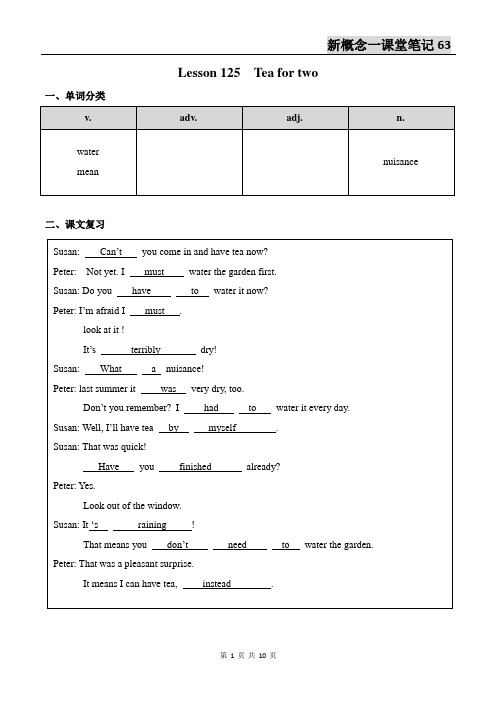
I'mterriblysorry.我非常抱歉。
I’ve got aterribletoothache.我得了要命的牙疼。
dry
1.adj.干燥的
反义词:wet
2.v.使...变干
It is alwaysdryinfall.秋天天气干燥。
2. ____ bright girlsthey are!
A. WhatB. What a C. How D. How a
3. ____ interestingthe film is!
A. What B. What anC. HowD. How a
4. ____ sunny day! Let’s go out for a walk.
这个单词是什么意思?
The red lightmeans stop.红灯意味着停止。
Imean to traveltomorrow.
我打算明天去旅行。
surprise 1. n.意外的事,吃惊
to one’s surprise令某人吃惊的是
2.v.令人吃惊
surprising adj.令人吃惊的(物)
surprised adj.感到吃惊的(人)
be surprised at sth.对…感到惊讶
To my surprise, she is the mother of two children.
令我惊讶的是,她竟然是两个孩子的妈妈。
Youalways surpriseme.你经常让我惊喜。
This is such asurprisingthing.
我爷爷正在花园里浇花。
一杯水a glass of water
新概念英语第一册Lesson119-120笔记(语法点+配套练习+答案)

12. The studentswere reading(read) English when the teacher came in.
13. Look! The monkeyis climbing(climb) the tree.
I’d like you to meet a friend ofmine(I).
enter
1.v.t.进入
=go into
2.v.t.参加
enter the army参军
3.enter for报名参加
n.entrance入口
She entered the room quiety.
她悄悄地进入屋中。
Heenteredthe universityatthe age of 21.
--- I lost my wallet.
---Whendidithappen(happen)?
--- Yesterday afternoon.
Good things always happentome.
I don’t believe that.
我不相信这事发生在他身上。
My motherhappenedtofind my keytothe front door in the garden.
他21岁上了大学。
Alotofstudentsenteredforthis competition(比赛).
很多学生报名参加这个竞赛。
dark
1.adj.黑的,暗的
2.adj.深色的
3.n.天黑
before the dark天黑以前
新概念英语第一册Lesson41-42笔记(语法点+配套练习+答案)
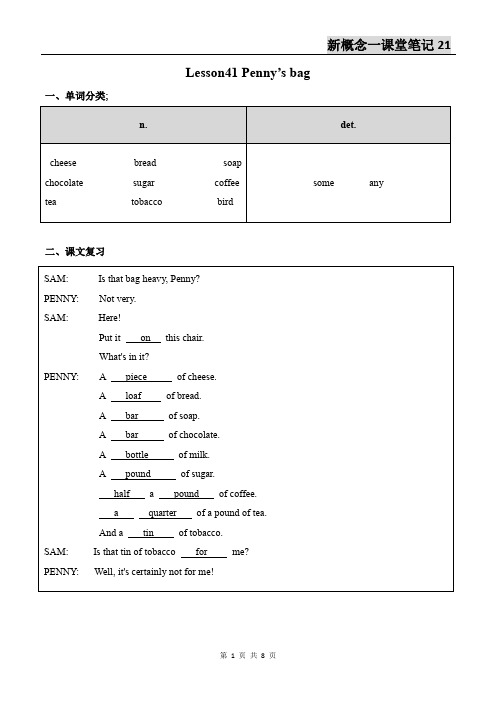
Lesson41 Penny’s bag 一、单词分类;二、课文复习三、课文重点四、语法解析1.名词可数名词前可用a/an ,但不可数名词不可用a/an 判断对错●She has got an apple juice in her hand. ( )●There are some apples on the tree. ( )●There is a water in the glass. ( )●Some coffee, please. ( )2.There be:某地有某物结构:There be + 名词+ 地点1.There is a book on the desk.2.There is an orange and two apples on the table.3.There is some bread in the paper bag.4.How many chairs are there in your classroom?5.There are two English books and a Chinese book in my bag.6.What’s in the purse? There is some money.7.Are there any children in the room?8.There is going to be a strong wind tomorrow.9.There were great changes in Harbin in the past ten years.10.There is going to be a sports meeting next Friday.There be句型中对不可数名词提问用what ;对数量提问用How much 。
There is some milk in the glass. What’s in the glass?There is some milk in the glass. How much milk is there in the glass?There is a bottle of water on the desk. What’s on the desk?There is a bottle of water on the desk. How much water is there on the desk?3.量词:用来描述名词的容量、形状、数量的词表示数量的量词有:a piece of paper / music / meat / bread一张纸、一首音乐、一块肉、一片面包a kilo of 一公斤...... a pound of 一磅......表示形状的量词有:a bar of 一块...... a bunch of 一束...... a drop of 一滴...... 表示容量的量词有:a glass of 一瓶...... a bottle of 一瓶......a bowl of 一碗...... a plate of 一盘...... 量词前可加:一半half 四分之一 a quarter of1. 一杯水 a glass of water2. 一片面包 a piece of bread3.一块巧克力a bar of chocolate4.一磅烟草 a pound of tobacco5. 四分之一瓶水a quarter of a bottle of water6. 一条面包 a loaf of bread7. 一罐可乐 a tin of coke8.一张纸 a piece of paper量词单数变复数a loaf of breadtwo loaves of breada bar of chocolatethree bars of chocolate a bottle of juicefive bottles of juice a kilo of applesthree kilos of apples.a pound of coffeetwo pounds of coffee a bar of soapsix bars of soap五、语法练习1. 用a , any , some填空There’s a photograph on the desk. There isn’t any milk in the bottle.Is there any milk in the bottle? There’s some milk in that cup.Is there any bread in the kitchen? There’s a loaf on the table. There’s some coffee on the table, too. There isn’t any chocolate in the table. There’s a spoon on that dish.Is there a soap on the dressing table?2.模仿例句提问并回答。
新概念英语第一册Lesson117-118笔记(语法点+配套练习+答案)

put ... into ...
把...放到
have/has been to
曾去过某地
四、语法解析
1.现在进行时:说话此刻正在发生
结构:be (am/is/are) + v.ing
时间标志词:Look! Listen! now, at the moment
练习:
1.One of themis taking(take) photos for us now.
11.Didyoufinish(finish) your homework yesterday?
12.Her motherdidn’t give(not give) the girl any present.
13.When hewent(go) back to England, hewass(be) very tired.
The childrenwereallhappy.
Bothof the twins wanted to go to the theatre.
Allof my classmates are invited to my party.
three times三次
现在完成时的标志词
twice两次
once一次
have/has been to去过某地,已回
have/has gone to去了某地,未回
My father isn't at home, hehas gone toBeijing.
Mr Wang isn't here.Hehas gone toQingdao.
My fatherhas been toBeijing twice.
Ihaveneverbeen tothe Great Wall.
新概念英语第一册Lesson33-34笔记(语法点+配套练习+答案)

1. There are some cloudsin the sky.
2. Today, the sun is shining.
3. I often walkto school .
4. Plane we can also say aeroplane.
5. There are many ships on the river.
Ihavea good father and a good mother.
There aresomebookson the desk.
Hehasa new pencil-case.
There isa basketball in the playground.
2.现在进行时
定义:说话此刻正在发生
结构:be + v.ing
shine v.闪耀,发光
sunshine n.阳光
The sun shines brightly in the sky.
太阳在空中闪耀。
family
1.家庭(单数)
2.家庭成员(复数)
My familyaregoing on holiday next holiday.
My familyisnot very big
2. Make… She ismakingthe bed.
3. Come… He iscoming.
4. Shine… The sun isshining.
5. Give … He isgivingme some magazines.
2.模仿例句完成句子。
Example:the children/looking at the boats on the boat
新概念英语第一册语法及专项练习
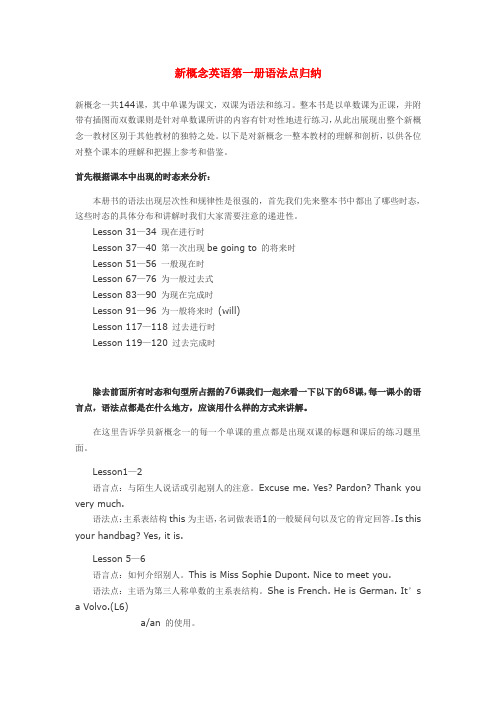
新概念英语第一册语法点归纳新概念一共144课,其中单课为课文,双课为语法和练习。
整本书是以单数课为正课,并附带有插图而双数课则是针对单数课所讲的内容有针对性地进行练习,从此出展现出整个新概念一教材区别于其他教材的独特之处。
以下是对新概念一整本教材的理解和剖析,以供各位对整个课本的理解和把握上参考和借鉴。
首先根据课本中出现的时态来分析:本册书的语法出现层次性和规律性是很强的,首先我们先来整本书中都出了哪些时态,这些时态的具体分布和讲解时我们大家需要注意的递进性。
Lesson 31—34 现在进行时Lesson 37—40 第一次出现be going to 的将来时Lesson 51—56 一般现在时Lesson 67—76 为一般过去式Lesson 83—90 为现在完成时Lesson 91—96 为一般将来时(will)Lesson 117—118 过去进行时Lesson 119—120 过去完成时除去前面所有时态和句型所占据的76课我们一起来看一下以下的68课,每一课小的语言点,语法点都是在什么地方,应该用什么样的方式来讲解。
在这里告诉学员新概念一的每一个单课的重点都是出现双课的标题和课后的练习题里面。
Lesson1—2语言点:与陌生人说话或引起别人的注意。
Excuse me. Yes? Pardon? Thank you very much.语法点:主系表结构this为主语,名词做表语1的一般疑问句以及它的肯定回答。
Is this your handbag? Yes, it is.Lesson 5—6语言点:如何介绍别人。
This is Miss Sophie Dupont. Nice to meet you.语法点:主语为第三人称单数的主系表结构。
She is French. He is German. It’s a Volvo.(L6)a/an 的使用。
Lesson 7—8语言点:如何自我介绍和相互认识。
新概念英语第一册语法及专项练习.docx
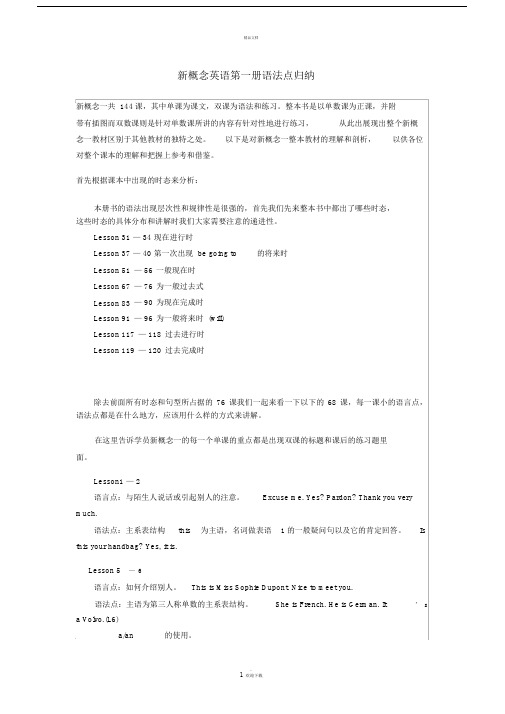
精品文档新概念英语第一册语法点归纳新概念一共 144课,其中单课为课文,双课为语法和练习。
整本书是以单数课为正课,并附带有插图而双数课则是针对单数课所讲的内容有针对性地进行练习,从此出展现出整个新概念一教材区别于其他教材的独特之处。
以下是对新概念一整本教材的理解和剖析,以供各位对整个课本的理解和把握上参考和借鉴。
首先根据课本中出现的时态来分析:本册书的语法出现层次性和规律性是很强的,首先我们先来整本书中都出了哪些时态,这些时态的具体分布和讲解时我们大家需要注意的递进性。
Lesson 31 — 34 现在进行时Lesson 37 — 40 第一次出现 be going to的将来时Lesson 51— 56一般现在时Lesson 67— 76为一般过去式Lesson 83— 90为现在完成时Lesson 91— 96为一般将来时 (will)Lesson 117— 118过去进行时Lesson 119— 120过去完成时除去前面所有时态和句型所占据的76课我们一起来看一下以下的68课,每一课小的语言点,语法点都是在什么地方,应该用什么样的方式来讲解。
在这里告诉学员新概念一的每一个单课的重点都是出现双课的标题和课后的练习题里面。
Lesson1 — 2语言点:与陌生人说话或引起别人的注意。
Excuse me. Yes? Pardon? Thank you very much.语法点:主系表结构this为主语,名词做表语1的一般疑问句以及它的肯定回答。
Is this your handbag? Yes, it is.Lesson 5—6语言点:如何介绍别人。
This is Miss Sophie Dupont. Nice to meet you.语法点:主语为第三人称单数的主系表结构。
She is French. He is German. It’ s a Volvo.(L6)a/an的使用。
Lesson 7 — 8言点:如何自我介和相互。
新概念英语第一册Lesson83-84笔记(语法点+配套练习+答案)
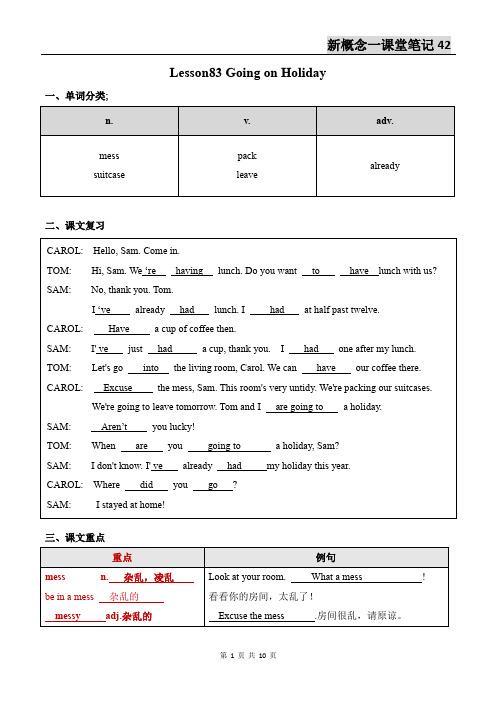
4、词组
1.go on holiday
2.have a holiday
度假
Excuse the mess.
乱七八糟,请原谅
have lunch
吃午饭
have tea
喝茶
hace a cup of coffee
喝杯咖啡
stay at home
2.She hasneverbeen to the UK.
3.Have theyeverread this storybefore?
4.I have seen this filmthree times.
5.Have you packed your caseyet?
结构:
1.主语+ have +过去分词
练习:(翻译)
1.I have already had a meal.我已经吃过饭了。
2.They have just finished their work.他们刚刚完成工作。
3.She hasn’t opened the door yet.她还没有开门。
4.Have you had breakfast yet?你吃过早餐了吗?
看看你的房间,太乱了!
Excuse the mess.房间很乱,请原谅。
Look at the room. It’sina mess.
It takes time to clean up thismessy(mess) house.
pack v.打包
suitcase n.手提箱
pack the suitcase收拾行李
2.He has already had some milk.
新概念英语第一册Lesson29-30笔记(语法点+配套练习+答案)
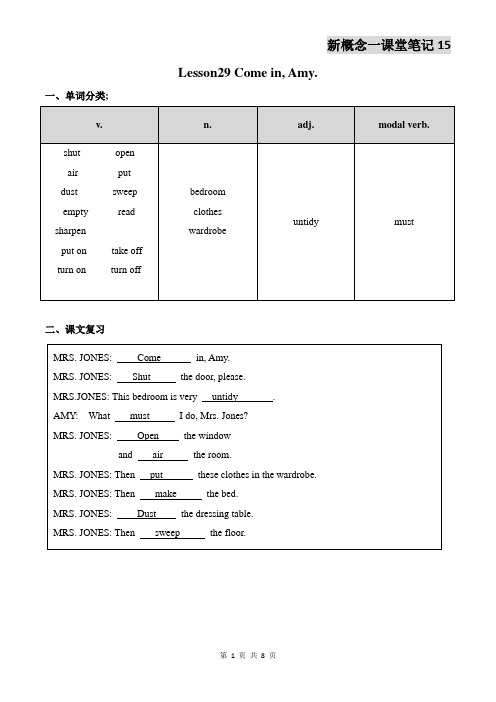
come in
进来
dust the dressing table
给梳妆台除尘
shut the door
关门
sweep the floor
扫地
open the window
开窗
What must I do?
我该做什么?
air the room
给房间通风
put the clothes in the wardrobe
The dustbin is full. Please take the dustbin out andemptyit.
sharpen v.削尖,使...锋利
sharpener n.削笔刀
sharp adj.锋利的
The pencil is blunt.
Get asharpenerandsharpenit.
The floor is dirty, please sweepit.
It’s hot, take offyour coat.
It is dark, turn offthe light.
七、语法练习
1.模仿例句写出相应的祈使句:
Example:The cup isn’t empty.
Empty it!
句型:
肯定句:①Do型:
Look out!/ Stand up! / Shut up!
②Be型:(Be+表语:形容词或名词)
Be careful! பைடு நூலகம் Be yourself! / Be quiet!
③Let型:
Let’s go!我们走!
Let me have a look.让我看一看。
否定句:①Don’t +动词原形
新概念英语第一册Lesson111-112笔记(语法点+配套练习+答案)

sth. cost sb.M
take主语是It,花费时间
It takes sb.T todo sth.
pay主语是人,花费金钱
sb. payMfor sth.
我买这块蛋糕花了3美元。
spend--I spent 3 dollars on this cake.
cost---This cake cost me 3 dollars.
You can buy it oninstalments(instalment).
Mr. Frith would like to buy the house oninstalments.
price n.价格
high price高价low price低价
The price of the trousersis(be) 200 yuan.
这个是我们店里最贵的型号。
afford v.付得起
(can) afford付得起
(can’t) afford付不起
afford to do sth.付得起做...
That’s too expensive . We can’taffordall that money.
How can youaffordso much money for a bicycle?
We put down adepositof thirty pounds on the TV.
Then we’ll pay the other amount.
You can pay adepositof fifty pounds and then
sixteen poundamonthforfour years.
以分期付款的方式购买
新概念英语第一册语法及专项练习汇编
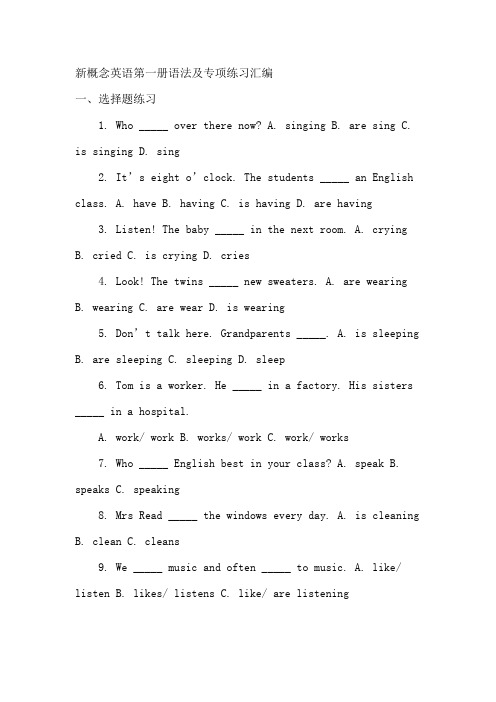
新概念英语第一册语法及专项练习汇编一、选择题练习1. Who _____ over there now? A. singing B. are sing C. is singing D. sing2. It’s eight o’clock. The students _____ an English class. A. have B. having C. is having D. are having3. Listen! The baby _____ in the next room. A. cryingB. criedC. is cryingD. cries4. Look! The twins _____ new sweaters. A. are wearingB. wearingC. are wearD. is wearing5. Don’t talk here. Grandparents _____. A. is sleepingB. are sleepingC. sleepingD. sleep6. Tom is a worker. He _____ in a factory. His sisters _____ in a hospital.A. work/ workB. works/ workC. work/ works7. Who _____ English best in your class? A. speak B. speaks C. speaking8. Mrs Read _____ the windows every day. A. is cleaningB. cleanC. cleans9. We _____ music and often _____ to music. A. like/ listen B. likes/ listens C. like/ are listening10. She _____ up at six in the morning. A. get B. getsC. getting11. On Sunday he sometimes _____ his clothes and sometimes _____ some shopping.A. wash/ doB. is washing/ is doingC. washes/ does12. The twins usually _____ milk and bread for breakfast, but Jim _____ some coffee for it.A. have/ haveB. have/ hasC. has/ have二、填空:1. My father always __________(come) back from work very late.2. The teacher is busy. He __________ (sleep) six hoursa day.3. Listen! Joan __________(sing) in the classroom. She often __________ (sing) there.4. __________ your brother __________(know) Japanese?5. Where __________ you __________ (have) lunch every day?6. The girl __________(like) wearing a skirt. Look! She __________(wear) a red skirt today.三、写出下列动词的现在分词形式1. work___________ sing__________ play__________study__________2. dance__________ have__________ write__________take__________3. run__________ sit__________ shop__________swim__________4. lie__________四、写出下列动词的第三人称单数形式1. work__________ read__________ clean__________write__________2. teach__________ wash__________ guess__________ watch__________3. go__________ do___________ photo__________4. study__________ fly__________ cry__________play__________5. have__________五、根据中文意思完成句子1、学生们在干什么?有一些在打电话,另一些躺在沙滩上。
新概念英语第一册Lesson143笔记(语法点+配套练习+答案)
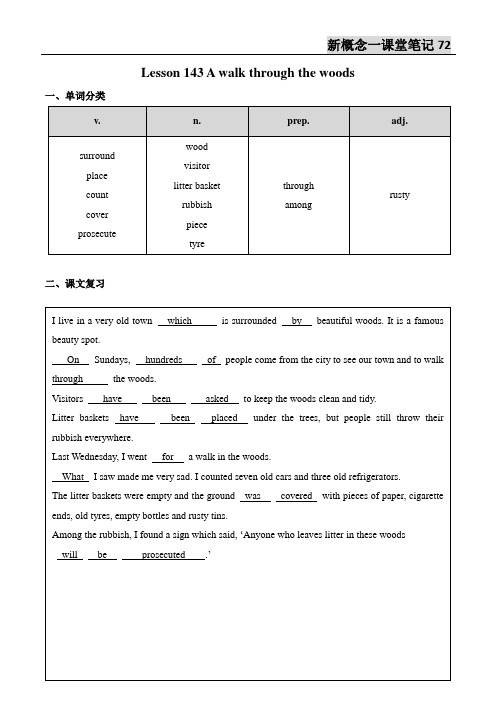
Whendidthis car accidenttake(take) place?
Ittook(take) place in the near street yesterday.
throw v.扔
(threw,thrown)
throw sth.tosb.投掷,传递
throw sth.atsb.砸……
beauty spotn.景点
beauty n.美丽,美autifullyadv.漂亮地
She was a such abeauty.(beautiful)
What abeautifulgarden. (beauty)
The dancer dancesbeautifully(beautiful)
This old man is walkingacrossthe street slowly.
litter
1.n.垃圾
litter basket废物筐
2.v.扔垃圾
be littered with …被扔满...
Don’t droplittereverywhere. (litter)
All his room islitteredwith socks and shoes. (litter)
Hundredsof students are invited to the party.
through prep.(从内部)穿过
acrossprep.横穿
throughthe forest穿过深林
throughthe window透过窗子
acrossthe road过马路
The baby is too young to sitthoughthe whole film.
新概念英语第一册Lesson93-94笔记(语法点+配套练习+答案)

2.Marywill see(see) her grandfather tomorrow.
3.Davidwill fly(fly) kites in the park this weekend.
4.Iwill make(make) a plan for English study in three days.
否定句:She won’t go to Sydney next week.
一般疑问句:Will she go to Sydney next week ?
答句:Yes, she will. / No, she won’t.
特殊疑问句:Where will she go next week?
练习二:(适当形式填空)
Anastronautis a person who flies in a spaceship.
return v.返回
=go back
回到某处
1.return to sp.
2.go back to sp.
return hone回家
return sth.归还某物
Hewill return(return) to Beijing in two days.
今天夜里
tomorrow night
明天夜里
the day after tomorrow
后天
next week
下周
the day after tomorrow in the morning
后天早上
next month
下个月
the day after tomorrow in the afternoon
新概念英语第一册语音、语法、情景对话及习题
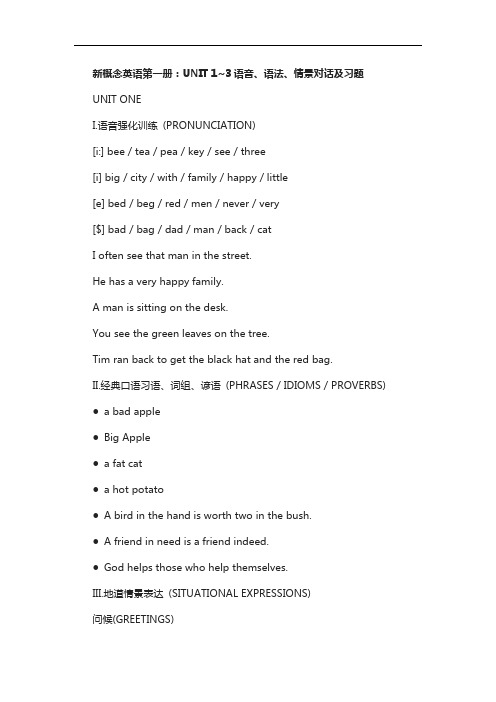
新概念英语第一册:UNIT 1~3语音、语法、情景对话及习题UNIT ONEI.语音强化训练(PRONUNCIATION)[i:] bee / tea / pea / key / see / three[i] big / city / with / family / happy / little[e] bed / beg / red / men / never / very[$] bad / bag / dad / man / back / catI often see that man in the street.He has a very happy family.A man is sitting on the desk.You see the green leaves on the tree.Tim ran back to get the black hat and the red bag.II.经典口语习语、词组、谚语(PHRASES / IDIOMS / PROVERBS) ●a bad apple●Big Apple●a fat cat●a hot potato●A bird in the hand is worth two in the bush.●A friend in need is a friend indeed.●God helps those who help themselves.III.地道情景表达(SITUATIONAL EXPRESSIONS)问候(GREETINGS)—Hi! / Hello! / Hullo! / How do you do?—(Good) morning / afternoon / evening!—How are you? / How are you going? / How are you all keeping?—Fine / Well. Thank you. And you? / What about you? / How about you?—Not too bad! / Pretty good! / Couldn't be better! / Just so-so. / I'm just my old self!—Nice / Glad / Pleased to see / meet you!—Nice to see you, too. / Same here!—It's my pleasure / honor to see you!—Haven't seen you for ages / for a long time.—Long time no see.UNIT TWOI.语音强化训练(PRONUNCIATION)[D:] work / girl / nurse / first / dirty / bird[D] around / o'clock / driver / arrive / forget / famous[K] nut / country / color / must / under / motherI love my country.Another fly-over will be built across that street.You fall in love with my sister!It's fun to run and jump in the sun.The first person in a clean shirt works in my firm.Her younger brother's daughter was a driver.II.经典口语习语、词组、谚语(PHRASES / IDIOMS / PROVERBS) ●loseone's shirt●keep one's shirt on●eat like a bird●a small potato●The early bird catches the worm.●Kill two birds with one stone.●Two heads are better than one.III.地道情景表达(SITUATIONAL EXPRESSIONS)道别SAYING GOODBYE—See you (soon / later / next time / ...)—Good night. / Goodbye. / Bye-bye.—It's nice to see you.—How time flies! I have to be going now.—I must go off / be off / be leaving.—I suppose I'd better go.—I'm really enjoying meeting you.—It's a pleasure to be with you here, but ...—I can't believe that time has come to say goodbye to you. —Thank you for all you've done for me.—Let's keep in touch. / Don't forget to drop me a line.—All the best to you. / Remember meto you ...—We must get together again soon.UNIT THREEI.语音强化训练(PRONUNCIATION)[p] pea / pat / pair / pet / help / hope[b] bee / bat / bear / bet / lab / buy[t] tie / tear / let / tall / fat / that[d] die / dear / lead / bad / glad / down[k] pick / back / mark / cook / lake / kind[E] pig / bag / give / goat / beg / girlIt makes me sick to think of it.The cook is baking a cake.Please pass Peter's parents two pieces of paper.Do as I did, or you'll do what shouldn't be done.A good girl is going to her grandma for some good apples. II.经典口语习语、词组、谚语(PHRASES / IDIOMS / PROVERBS) ●during the dog days●get one's goat●black and blue●as busy as a bee●a green hand●rob Peter to pay Paul●Every dog has his / its day.语法小练习:●Fill in blanks with a / an.1. Stella is ________ student, and she studies in ________ university. She is ________ American.2. How many days are there in ________ year? How many minutes are there in ________ hour?3. Our teacher is talking with ________ old man from ________ France.4. There is ________ oil painting on the wall.●Fill in blanks with is / am / are / my / your / her / his1. I ________ a new student. ________ name ________ Alice. I ________ French.2. What nationality ________ you? I am ________ American. My brother ________ a teacher. ________ name is Mr. King. My aunt ________ an actress. ________ name ________ Stella.3. Sue ________ my sister. She ________ a nurse. She likes ________ job.翻译小练习:1. Is that mechanic hardworking(勤劳的)? Yes, he is.2. What does the young girl do? She is a housewife.3. She doesn't work hard. She is very lazy.4. What nationality are you? I'm Spanish.5. What colour are your new cases? Brown.新概念英语第一册:UNIT 7~9语音、语法、情景对话及习题UNIT SEVENI.语音强化训练(PRONUNCIATION)[f] five / life / face / fish / fame / fate[v] very / visit / every / vote / victory / over[s] say / sorry / first / advice / student / school[z] zero / zip / zoo /[L] think / mouth / thin / tooth / thief / cloth[M] this / those / there / than / them / clothesFive fellows ate five fish on February the first.Britt visits the small village every weekend.The parking zone is near the zoo.A sleeping baby was sleeping in the sleeping car.Alice left her mother and father and went to her brother's.II.地道情景表达(SITUATIONALEXPRESSIONS)电话实用句式Telephone conversation:—Hello, is that ... (speaking)? / Here is ... (speaking). Is ... there? —This is ... (speaking). Who's that?—May I know who is calling, please?—May I speak to / have a word with ...? / I'd like to speak to ... —Hello! Can I help you? Whom do you want to speak to? —All right. Hold on please.—Sorry, he / she isn't in. May I take a message for you?—Would you like him to call you back? Could you leave your number?—Would you mind calling back later? —I'll tell him to ring back.—I'm sorry, there's no one here by the name.—I'm afraid you've got / dialed the wrong number.III.重要语法Grammar (注意课上老师的讲解!!)人称代词的用法UNIT EIGHTI.语音强化训练(PRONUNCIATION)[Au] how / about / mouse / hour / loud / outside[Du] cold / home / go / post / goat / smokeI wouldn't get his goat for small things.He is nobody and holds no post here.It's getting darker and darker outside.Read it louder and so that I can hear you better.II.经典口语习语、词组、谚语(PHRASES / IDIOMS / PROVERBS)●Be left in the cold●A bed of roses●Go bananas●A black sheep●A piece of cake●Do it well or not at all.●Look before you leap.●Easier said than done.III.地道情景表达(SITUATIONAL EXPRESSIONS)表述时间的句式Time:on time in time in no time off and on—What's the time (by your watch)?—What time do you have? / What time is it?—It's at ... o'clock. (past / to / half past)—What's the date today? / What was the date yesterday? —What day is it today? / What's the day today?—It's time for ... / It's time to ... / It's time that ...—Time is limited / running out.—I suppose it's about time (that) ...—What's the business time of this bank?—When is the meeting? / When does the meeting begin? UNIT NINEI.语音强化训练(PRONUNCIATION)[N] she / shy / cash / show / short / shore[I] measure / treasure / pleasure / usual / television / decision [h] happy / have / hope / horse / head / help[r] red / rose / green / river / road / right[w] wait / week / water / west / woman / weather[j] yes / yellow / young / your / year / yesterdayI'm sure she sells seashells on the seashore.I can't measure the pleasure when I see the treasure.The happy man is heading for the high hill.Robert was running around.The young people wore a yellow hat yesterday.II. 总结与操练(PRACTICE)语法小练习:Fill in the blanks:1. This ________ a black pen. Those ________ red pens. The black one isn't my pen. The red ones ________ mine.2. Tim is a policeman. Paul is a ________, too. So Tim and Paul are both ________ .3. I have a blue bag. You have a brown ________ .4. His shirts are old. The new ________ are not his shirts.5. This is my bedroom. There is a desk ________ the room. There________ some books ________ the desk. There is a picture ________ the wall. ________ the picture there are some lovely dogs. There ________ also two chairs and a bed ________ the desk.6. ________ your bed after you get up.7. ________ forget to lock the door when you go out.翻译小练习:1.这些不是我们的汽车。
新概念英语第一册课后练习题(语法测试试题)

新概念英语第一册课后练习题(语法测试试题)新概念英语第一册课后练习题(语法测试试题)新概念英语第一册语法测试试题1(1) 数词, 冠词, 介词, 动词时态变化, 比较级和级一写出复数1. radio2. knife3. glass4. shelf5. boss6. dress7. housewife8.postman9. leaf 10. church 11. mouth 12. family13. tie 14. tomato 15. piano 16. baby17. tooth 18. country 19. key 20 potato21. match 22. box 23. hour 24. hero二用冠词a, an, the 或 some , any 填空, 如果不需要,则用 / 代替.1. Alice is ____ air-hostess. Her father is ____ engineer and her mother is _____ housewife. They all play______ tennis very well.2. He has ____ uncle and his uncle lives in ____ United Kindom. He first saw him in ____ autumn of 1978. 7. We need _____ ink, is there _____ left?3. It is better to tell ______ truth than to tell_______ lies.4. Will you have ______ m ore tea? There’s plenty in the pot.5. There is ___university near my home. Every Saturday evening,___ students hold ____ party.___ are dancing, ____ are singing. They make a lot of noise.6. Get me ________ cigarettes, please. ______ kind will do.三用适当介词填空.1. Can you see the words written ________ the blackboard? (in, on, by, with)2. She is taking the children out _______ a walk. (in, on, for, by)3. You can choose the best one ________ them. (in, on, among, by)4. Jack broke the chocolate _______ several pieces. (in, on, with, into)5. There are two bridges ______ the river. ( in, on, with, into)6. There is a slogan(标语) _______ the wall. (on, in, over, above)7. He sits ________ his desk all day _______his head_______ his hands. He is deep in thought. (on, in, at, with)8. _______ the help _______ the teachers, the students have made great progress _______their study. (on, in, of, with)9. He will be back _______ a minute. ( on, in, for, by)10. The teacher is standing _______ the class. (on, before, to, in)11.Our train arrived_____Shanghai_____6:30______a foggy November day .(on, in, at, by)四用所给词的适当形式填空1. Tom ______ (be) ill last week, he ______ (be) much better now.2. Jimmy and his sister _______ (be) here several days ago.They ________ (leave) for Beijing yesterday.3. He ___________ (have ) a bath when the telephone________(ring).4. While I __________ (cook ) the dinner, he___________(read) the paper.5. He arrived just as I _____________ (answer) the phone.6. After I heard the news, I ___________ (hurry) to see him.7. We ____________ (be) disappointed if there is no snow for Christmas.8. You ____________ (lie)! Stop it, and tell the truth like a man.9. I _________ (be) hungry since fiv e o’clock this morning.。
新概念英语第一册-语法练习(一)

新概念英语第一册语法练习(一)新概念英语第一册语法:一般现在时英语中的时态一共有八种,它们是:一般现在时、现在进行时、一般过去时、现在完成时、一般将来时、过去进行时、过去完成时、过去将来时。
今天我们所要讲的就是第一种:一般现在时——表示一般性,经常性的动作或一般性事实。
1、含有be动词的句子He is a teacher.The girl is very beautiful.Tim and Jack are students.★变疑问句将be动词移到句首Is he a teacher?Is the girl very beautiful?Are Tim and Jack students?★变否定句在be动词后面加notHe is not a teacher.The girl is not very beautiful.Tim and Jack are not students.★肯定回答及否定回答Yes, he is. / No, he is not.Yes, she is. / No, she is not.Yes, they are. / No, they are not.2、不含有be动词的句子,即含有一般动词的句子。
(1)第三人称单数及单数名词He likes books.She likes him.The dog likes bones.★变疑问句在句首加does, 动词变为原型Does he like books?Does she like him?Does the dog like bones?★变否定句在主语及动词之间加doesn't, 动词变为原型,原句中的动词不再有第三人称变化。
He doesn't like books.She doesn't like him.The dog doesn't like bones.★肯定回答及否定回答:Yes, he does. / No, he doesn't.Yes, it does. / No, it doesn't.注意:第三人称单数形式一般在动词后面加S,不要和名词复数混淆,变否定句或疑问句时名词复数没有任何变化。
新概念第一册部分语法及相关练习题

新概念第一册部分语法1. 问句:一般疑问句,特殊疑问句,选择疑问句,反意疑问句,选择疑问句,否定疑问句1)一般疑问句:助动词/be动词+主语Are you a teacher? Do you want to have a cup of tea?2)特殊疑问句:特殊疑问词+一般疑问句What is your name?3)选择疑问句:orDo you want beef or lamb?4)反意疑问句:肯定陈述句+否定疑问部分,否定陈述部分+肯定疑问部分You don’t need that pen, do you?5)否定疑问句:一般疑问句+否定词Aren’t you lucky? Don’t you want have a rest?2. 现在完成时1)构成:主语+助动词have, has+过去分词2)用法:①表示过去发生的和现在有某种联系的动作,常和just, usually, already, since 等时间副词连用I have just had lunch. (饱了,不用再吃了)He has had a cup of tea.(不渴了,不用再喝)They have already had their holiday. (不能再度假了)The boy has already read the book. (已经知道书的内容了,不用再看了)②询问别人是否做过某事一般用现在完成时:Have you finished your homework?///Have you been to Beijing?///Have he seen the film?③表示开始于过去并持续到现在的动作I have lived in Beijing for twenty years.///I have worked for this school for 1 year.④表示一种经历,经验:去过…地方,做过…事情,经历过…事情I have never had a bath.///I have never seen a film.I have never been to cinema. ///I have ever been to Paris.注:Have been to表示去过,have gone to 表示去了I have been to London.(人已经回来)//////He has gone to London.(人还在那里)⑤表示一种结果,一般不和时间副词联用I have lost my pen.///I have hurt myself.He has become a teacher.///She has broken my heart.3)句型变化:★变疑问句将助动词移到句首,变否定句在助动词后面加not.e.g. Have you lost your pen? I have not lost my pen.★肯定回答及否定回答:Yes, I have. No, I have not.★特殊疑问句:What have you done? /// What has he done?一般过去时与现在完成时的区别:凡是有明确的表示过去的时间状语的句子为过去时3. 过去完成时:1)用法:在过去的时间里,两个动作中,发生在前的哪个动作要用过去完成时。
新概念英语第一册第1-5课语法练习题
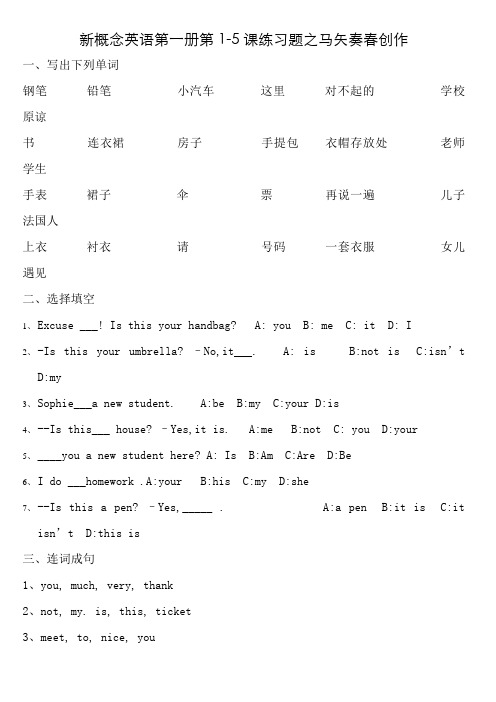
新概念英语第一册第1-5课练习题之马矢奏春创作一、写出下列单词钢笔铅笔小汽车这里对不起的学校原谅书连衣裙房子手提包衣帽存放处老师学生手表裙子伞票再说一遍儿子法国人上衣衬衣请号码一套衣服女儿遇见二、选择填空1、Excuse ___! Is this your handbag? A: you B: me C: it D: I2、-Is this your umbrella? –No,it___. A: is B:not is C:isn’tD:my3、Sophie___a new student. A:be B:my C:your D:is4、--Is this___ house? –Yes,it is. A:me B:not C: you D:your5、____you a new student here? A: Is B:Am C:Are D:Be6、I do ___homework .A:your B:his C:my D:she7、--Is this a pen? –Yes,_____ . A:a pen B:it is C:itisn’t D:this is三、连词成句1、you, much, very, thank2、not, my. is, this, ticket3、meet, to, nice, you4、a, LuMing, is, student, new5、German, Hans, is6、Chinese, too, Xiaohui, is四、改错1、Is this you dress?2、Here your umbrella and your coat.3、Thank very much.4、Nice meeting you.5、This not is my skirt.6、Morning good, Mr. Blake!7、He is not you teacher.8、--Is this your coat?—Yes,it isn’t.五、按要求改写下列句子1、This is your handbag.(改为一般疑问句)2、My ticket is here,(改为否定句)3、That is my watch.(改为否定句)4、Is this your coat? (改为陈述句)5、This is my school(改为否定句)6、That is your son.(改为否定句)7、It is your shirt.(改为一般疑问句)8、This is your house.(改为一般疑问句)9、Is this your watch?(改为陈述句)10、That is your daughter.(改为一般疑问句)六、汉译英1、请帮我拿我的大衣和雨伞。
- 1、下载文档前请自行甄别文档内容的完整性,平台不提供额外的编辑、内容补充、找答案等附加服务。
- 2、"仅部分预览"的文档,不可在线预览部分如存在完整性等问题,可反馈申请退款(可完整预览的文档不适用该条件!)。
- 3、如文档侵犯您的权益,请联系客服反馈,我们会尽快为您处理(人工客服工作时间:9:00-18:30)。
新概念英语第一册语法点归纳新概念一共144课,其中单课为课文,双课为语法和练习。
整本书是以单数课为正课,并附带有插图而双数课则是针对单数课所讲的内容有针对性地进行练习,从此出展现出整个新概念一教材区别于其他教材的独特之处。
以下是对新概念一整本教材的理解和剖析,以供各位对整个课本的理解和把握上参考和借鉴。
首先根据课本中出现的时态来分析:本册书的语法出现层次性和规律性是很强的,首先我们先来整本书中都出了哪些时态,这些时态的具体分布和讲解时我们大家需要注意的递进性。
Lesson 31—34 现在进行时Lesson 37—40 第一次出现be going to 的将来时Lesson 51—56 一般现在时Lesson 67—76 为一般过去式Lesson 83—90 为现在完成时Lesson 91—96 为一般将来时(will)Lesson 117—118 过去进行时Lesson 119—120 过去完成时除去前面所有时态和句型所占据的76课我们一起来看一下以下的68课,每一课小的语言点,语法点都是在什么地方,应该用什么样的方式来讲解。
在这里告诉学员新概念一的每一个单课的重点都是出现双课的标题和课后的练习题里面。
Lesson1—2语言点:与陌生人说话或引起别人的注意。
Excuse me. Yes? Pardon? Thank you very much.语法点:主系表结构this为主语,名词做表语1的一般疑问句以及它的肯定回答。
Is this your handbag? Yes, it is.Lesson 5—6语言点:如何介绍别人。
This is Miss Sophie Dupont. Nice to meet you.语法点:主语为第三人称单数的主系表结构。
She is French. He is German. It’s a Volvo.(L6)a/an 的使用。
Lesson 7—8语言点:如何自我介绍和相互认识。
语法点:主语为第二人称的主系表结构。
Are you French?What nationality are you? What’s your job? 特殊疑问句。
Lesson 9—10语言点:朋友或熟识的人之间如何相互问候。
How are you?语法点:主系表结构形容词做表语。
介词短语表示位置near the window, on the televion, on the wallLesson 29—30语言点:如何发号命令。
语法点:祈使句(肯定)。
动词与宾语的固定搭配。
Lesson 37—38语言点:如何表达将要做的事情。
语法点:现在进行时态be going to do结构表达将要发生的事情。
There be 句型的一般疑问句形式。
Lesson 41-42语法点:如何表示不可数名词的量。
Lesson 63-64语言点:建议忠告。
语法点:don’t do…. You mustn’t do…Lesson 65-66语法点:具体时间表示法(半点和刻钟)。
反身代词。
具体日期表达方式。
Lesson 73-74语言点:问路。
语法点:不规则动词的过去式。
形容词转变成副词。
Lesson 77-78语言点:看病。
语法点:综合时间表达方式。
Lesson 105-106语言点:办公室用语。
语法点:want sb to do…./ tell sb to do…以及其否定形式。
Lesson 103-104语言点:考试。
语法点:宾语从句。
(从句部分为非现在时态)程度副词too, very ,enoughLesson 125-126语言点:/语法点:have to do…/ don’t need to do…Lesson 127-128语言点:娱乐界。
语法点:must/can’t 对现在事情的肯定/否定猜测。
Lesson 129-130语言点:交通状况。
语法点:must/can’t have been….对过去事情的肯定/否定猜测。
Lesson 131-132语言点:度假。
语法点:may 对现在/过去事情的肯定或否定猜测。
以下学的知识慢慢与新二接轨:现在完成时:Lesson 83—90直接引语变成间接引语:Lesson 99—102形容词的比较级和最高级:Lesson107—112neither ,so 的用法:Lesson 113—114不定代词的用法:Lesson 115—116过去进行和过去完成时:Lesson 117—120定语从句:Lesson 121—124情态动词的综合用法:Lesson 125—132直接引语变间接引语:Lesson 133—136(着重讲时态的倒推)if 的用法:Lesson 137—140被动语态:Lesson 141—1441)代词及be动词主格I we you you she/he/it they宾格me us you you her/him/it them代词所有格my our your your her/his/its their名词性代词mine ours yours yours hers/his/its theirsbe动词现在时Am are are are is arebe动词过去时was were were were was were2)名词的复数规则变化的名词复数形式规则1一般情况+s e.g. shell→shells toy→toys规则2以s, x, ch, sh结尾+es e.g. fox→foxes church→churches规则3以o结尾+s或+es e.g. radio→radios potato→potatoes规则4以f, fe结尾的,变f, fe为ves e.g. life→lives half→halves规则5以辅音字母+y结尾,变y为i+es e.g. sky→skies study→studies3)动词的第三人称单数形式规则1一般情况+s e.g. like-likes, look-looks规则2以s, x, ch, sh和o结尾+es e.g. do-does, catch-catches规则3以辅音字母+y结尾,变y为i+es e.g. carry-carries, fly-flies4)动词现在分词规则1一般动词加-ing e.g. look-looking, read-reading, play-playing规则2以不发音的字母结尾的单词去e加-ing e.g. make-making, take-taking, arrive-arriving规则3重读闭音节词结尾,即单词中只有一个元音字母,其后紧跟一个辅音字母的词,双写辅音字母再加-ing e. g. run-running, sit-sitting, get-getting, swim-swimming, stop-stopping5)动词过去式规则动词变化规则1 一般动词加-ed e.g. look-looked, watch-watched, play-played规则2 以e结尾的加-d e.g. make-maked, arrive-arrived规则3 以辅音字母y结尾的变y为i加-ed cry-cried, carry-carried规则4 重读闭音节词结尾,即单词中只有一个元音字母,其后紧跟一个辅音字母的词,双写辅音字母再加-ed stop-stopped过去式的读音在清辅音后面(除外)读/t/ e.g. walked, jumped在浊辅音和元音后读/d/ e.g. washed, watched在/t/,/d/后读/id/ e.g. waited, hated6)形容词和副词的比较级和最高级比较级规则1 一般加-er e.g. high-higher规则2 以e结尾加-r nice-nicer规则3 以辅音字母加y结尾,变y为i再加-er busy-busier规则4 重读闭音节结尾,双写辅音字母再加-er fat-fatter最高级规则1 一般加-est e.g. high-highest规则2 以e结尾加-st nice-nicest规则3 以辅音字母加y结尾,变y为i再加-est busy-busiest规则4 重读闭音节结尾,双写辅音字母再加--est fat-fattest7)常见缩写:is='s I am=I'm are='reis not=isn't /iznt/ are not=aren't /a:nt/do not=don'tdoes not=doesn'twas='sdid not=didn'tcan not=can'thave='vehas='shave not=haven'thas not=hasn'twill='llwill not=won'tshall not=shan't直接引语/间接引语如果引语的主句所用动词为过去时,那么间接引语要做相应变化:时态,人称,时间地点及指示词1)时态变化:一般现在时——一般过去时现在进行时——过去进行时一般过去时——过去完成时现在完成时——过去完成时一般将来时——过去将来时be going to——was/were going to/wouldcan--couldmay--might2)时间地点及指示词的变化:here-there, tomorrow-the next day, the following day, this-that…3)人称变化:根据句意改变人称。
4)直接宾语/间接宾语主语+及物动词+间接宾语+直接宾语直接宾语是及物动词的直接对象,间接宾语是及物动词的动作所涉及的人或事务,也可以说间接宾语表示动作是对谁做的,或者是为谁做的。
所以间接宾语要用名词或者宾格代词来担当。
He gives me a book.(me间接宾语,a book直接宾语)直接宾语和间接宾语的位置调换时要加一个介词to或for:主语+及物动词+直接宾语+介词+间接宾语Give me a book. = Give the book to me.Send him a letter. = Send a letter to him.Show him the new dress. = Show the new dress to him. 倒装句:so/neither的倒装eg: He can swim. So can I.She didn't go to class. Neither did I.结构:so/neither+be+ 主语so/neither+助动词+ 主语so/neither+情态动词+ 主语助动词:一般现在时: do, does/am, is, are现在进行时: am, is, are一般过去时: did现在完成时: have, has一般将来时: will, shall过去进行时: was, were过去完成时: had过去将来时: would现在进行时表示现在正在进行的动作。
